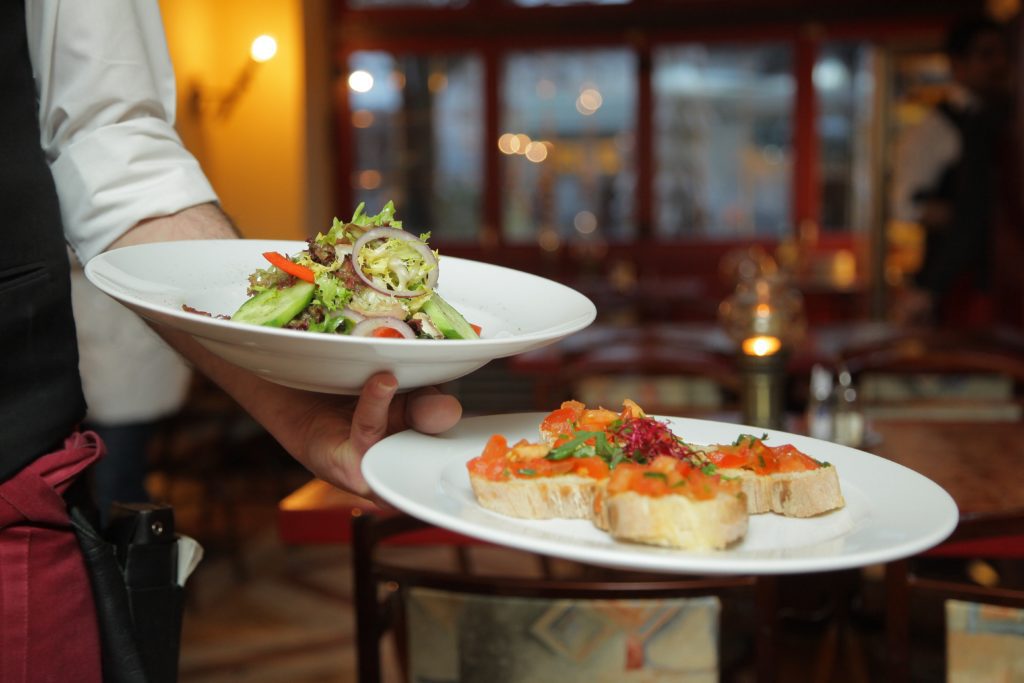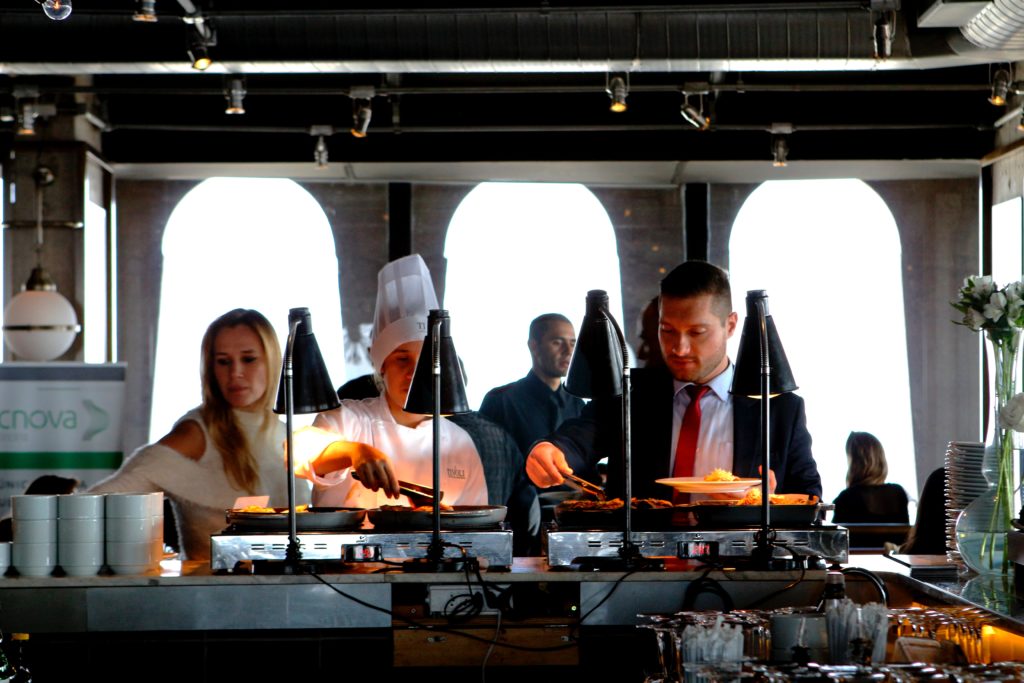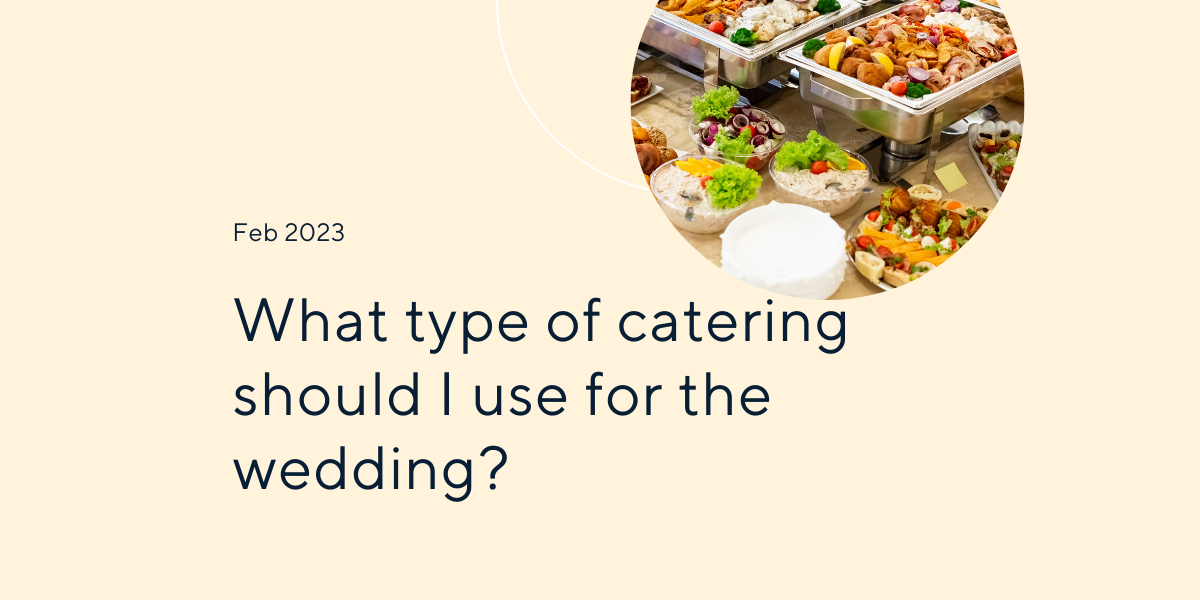Think of the most enjoyable dining experience you’ve ever had at a wedding. What made it so special? Chances are, the couple and/or their wedding planner selected the ideal catering style for that event.
No meaningful event is complete without delicious food presented in a pleasing way, and your wedding is certainly no exception. The dining experience is one of the most important aspects of a wedding reception. It’s something you and your guests will remember (hopefully fondly) for years to come, and the process of curating the perfect experience deserves careful planning and deliberation. So, let’s talk about catering!
How you decide on the right catering style depends on a few factors, such as your food budget, the venue, the number of guests, and the style and aesthetic of your wedding.
We’re going to break down a range of catering types so that you can decide which one is the best fit for your wedding. Next, we’ll explore options to consider in terms of whether you should hire caterers, do it yourself, or use in-house catering. Let’s “dig” in.
Catering Type #1: Classic Plated Dinner
Fancy cutlery. Gorgeous crockery. A mouth-watering multi-course meal. This catering type emphasizes luxury and lends itself to a relaxed, more time-intensive feast. It builds in lots of time for guests to chat and get to know one another in small groups, and it allows you, the newlyweds, to stop for a moment and catch your breath.
One con of a plated dinner is that it’s expensive. This is mainly due to the fact that it takes more labor to produce plated courses, and that means you’re paying more for the chef and service staff’s time.

Catering Type #2: Food Stations
Imagine a dynamic space in which various themed food options are set up in different areas of a big hall where your guests are free to sit at their tables or mill about the space, grazing at their leisure. On the right, there’s a raw bar featuring sushi, ceviche, and poke bowls. Off to the left is a sandwich bar with a smorgasbord of vegetables, deli meats, and different types of bread. In the back of the room, there’s a table with three different Asian fusion dishes, one of which is vegetarian.
Food stations like these are great because they imbue the reception with a feeling of novelty and choice, and everyone is likely to find something they love. Some couples also choose their food stations in such a way that each option supports their wedding theme from a different angle. For example, a couple who loves to travel might choose an ‘around the world’ theme and tie it into the reception by offering dishes from many different cuisines.
Another plus is that people with allergies will be able to find something that will be safe for them to eat. ‘Gluten-free’ or ‘dairy-free’ are also great themes for food stations.
Food stations can also prevent traffic jams at bigger weddings, where guests might grow frustrated waiting in a buffet line or waiting for servers to get to their tables. Multiple smaller buffets scattered around the space mean that your guests will get food in their bellies faster.
However, choosing food stations as your catering type can have one major downside, depending on the schedule you’ve set for the reception: If you’re short on time and/or want the meal to take up only a limited portion of the reception, food stations aren’t for you. The experience created by food stations works great when you want people to take their time, mingle while eating, and sample different items over the course of an afternoon or evening–but it will feel rushed and won’t flow so nicely if you try to pack it into a 1-hour timeslot.
Catering Type #3: Mini-bites
This one is relatively similar to food stations. However, food stations will often enable guests to easily put together a whole meal at the station(s) of their choice. It’s pretty easy to fill up on pasta at a pasta station, for example. Mini-bites, on the other hand, focus more on hors d’oeuvre-sized samples of many different fares. This is a good option for couples who don’t want to serve a big meal. Since seating isn’t required for this catering style, that also means complicated seating charts aren’t really necessary. Instead, tables and chairs can be scattered around the space or off to one side. Not as much seating is needed, either, because guests will be moving around a lot, and not everyone will be sitting down at the same time.
Make sure the timing of your wedding is appropriate for mini-bites. If it’s dinnertime, for example, your guests might be expecting a more substantial and cohesive meal. However, mini-bites are fine for an early afternoon reception at which guests are not expected to spend the whole day.
Catering Type #4: Buffet Style
Who doesn’t love a good, old-fashioned buffet? So long as your guest list isn’t too long, a buffet is sure to offer everyone plenty of options. Buffets are also one of the most affordable catering types; less labor is needed to prepare a buffet, which means you’ll save on labor costs.
If you do expect a lot of guests to attend, but you still prefer to use buffet-style catering, there is one thing you can do to make the process more efficient. Rather than letting everyone come up to get food all at once, you can call each table up individually. This is an extra task for someone, but it makes things run a little more smoothly. Your guests will need to be patient, but what’re a few extra minutes getting to know their table neighbors?
One potential drawback of buffet-style catering is that it’s generally regarded as informal, so it might not fit in with the theme and aesthetic of your wedding if you’re going for something more upscale. But if you want your reception to be an informal affair, a buffet is a suitable option.

Catering Type #5: Family Style
You arrive at the reception and sit down, and within minutes your table is decked out with platters full of food in the center. Rather than everything being plated by the service staff, guests serve themselves and pass items around the table. This is family-style catering, and it’s a semi-casual option midway between the informality of a buffet meal and the extravagance of a plated meal. It also has a knack for fostering connection since guests who don’t necessarily know each other have to interact in order to share and pass food.
One con of a family-style meal is that more serving dishes will need to be rented, which racks up more meal expenses. You’ll also need to have an abundance of food available so that there are no shortages if some dishes prove more popular than others.
Catering Type #6: Cake and Punch
Suppose you’re a couple on a budget; if you plan to have a late-night reception, or if you prefer a short and sweet celebration, this one’s for you! Cake and punch-style catering is skipping the dinner and going straight for dessert and beverages. That means your only catering expenses are wedding cake and drinks of your choice, plus (minimal) labor. In fact, you can even eliminate the labor costs entirely by having someone in your wedding party serve cake and setting up a table for everyone to go get drinks at their convenience.
Of course, this option is only right for a narrow range of weddings. If you expect your guests to stick around for longer than an hour or two or if your theme is more upscale, cake and punch won’t work.
Catering Type #7: Food Trucks
Food trucks have exploded in popularity in recent years, making them a trendy choice for wedding catering. Many of them offer wedding packages that allow guests to choose dishes from a set menu. If you’re having an outdoor wedding or a wedding at a private residence, food trucks will blend well with the aesthetic of your wedding. They’re also a great way to introduce your out-of-town guests to some of your favorite local foodie culture. And last but not least, food trucks are typically much more affordable than hiring a catering company.
However, it’s important to consider whether your venue has the right setup for food trucks. If guests need to walk far to receive their food, it will upset the vibe and make the event feel less cohesive. For food truck-style catering to work, the truck(s) must be conveniently located with regard to where the center of the action is at your wedding. You should also consider other catering options if you’re having a large wedding, as many food trucks are not accustomed to or set up for huge lines. Alternatively, you could hire two or more food trucks and allow your guests to choose between them.
These are arguably the seven most common catering types. However, your wedding is your day, and if you have another idea, go for it! This is a time to embrace your creativity and construct a personalized, unforgettable experience to share with your nearest and dearest.
Answering the ‘Who?’ of Catering
You have three main options when it comes to deciding who to appoint to cater your wedding: using in-house catering, hiring an external catering company, or doing your own catering DIY-style. As with the catering types above, which is right for you will depend on your unique set of circumstances and preferences. Here are the pros and cons of all three options.
In-House Catering: Many venues offer their own in-house catering options. In fact, some venues even mandate that you use their in-house catering team if you host your reception through them; this is an important consideration in choosing a venue if you’re not sold on the idea of in-house catering. In many ways, though, in-house catering is the least stressful option. If you hire outside caterers, coordination is necessary between the venue and the catering company, and if you opt for DIY catering, you’re going to have a lot of work on your plate. In-house catering requires the least input from you and/or your wedding planner.
If you choose to go this route, the venue’s catering team will handle everything from setup to tear down. They’ll also be willing to work with you on the menu and catering type. That said, not every venue’s in-house catering will be able to accommodate every catering type listed above, so it’s important to ask specific questions about what catering types are available.
Caterers for Hire: The advantage of working with outside caterers rather than in-house caterers is that you have a lot more options. You can call up your favorite local restaurants and see if they provide wedding catering. You can browse many companies, each with its own unique characteristics and flavors. As with an in-house catering team, you won’t have to worry about planning, cooking, procurement, or cleanup–it will all be taken care of for you, leaving you to relax and focus on making memories during the reception. However, outside caterers can be expensive, and you or your wedding planner will also need to act as a bridge between the caterers and the venue.
DIY Catering: More and more couples are opting to self-cater their own weddings. It’s both the most personal style and the most budget-friendly. For those who love to cook, self-catering can be a way to create exactly the flavors they’re looking for to tie in well with their theme and/or share their favorite dishes with friends and family. Some couples also have close friends or family members involved in the food preparation process; just as members of the wedding party are traditionally given different tasks, some could be appointed to cook, set up, serve, and clean up. Potluck-style receptions are also not unheard of.
DIY catering is definitely on the informal end of the spectrum, so it will only work for casual weddings. Since it’s not typical, it could also be subject to increased scrutiny by guests with more traditional expectations around wedding catering.
Final Thoughts
We hope this breakdown of catering options has provided an actionable framework for you to work from. If you’re not sure who to hire, whether to cater your own wedding or which catering type to choose, liaise with your venue or wedding planner. You might also set up meetings with a few different caterers in order to really get a lay of the land, helping you to envision what your reception will feel like by trying on different possibilities. If you have friends and family who have recently gotten married, they can also be great resources for offering insights and advice on how to choose. Good luck and happy planning!

Nicole Sheehey is the Head of Legal Content at HelloPrenup, and an Illinois licensed attorney. She has a wealth of knowledge and experience when it comes to prenuptial agreements. Nicole has Juris Doctor from John Marshall Law School. She has a deep understanding of the legal and financial implications of prenuptial agreements, and enjoys writing and collaborating with other attorneys on the nuances of the law. Nicole is passionate about helping couples locate the information they need when it comes to prenuptial agreements. You can reach Nicole here: [email protected]

0 Comments